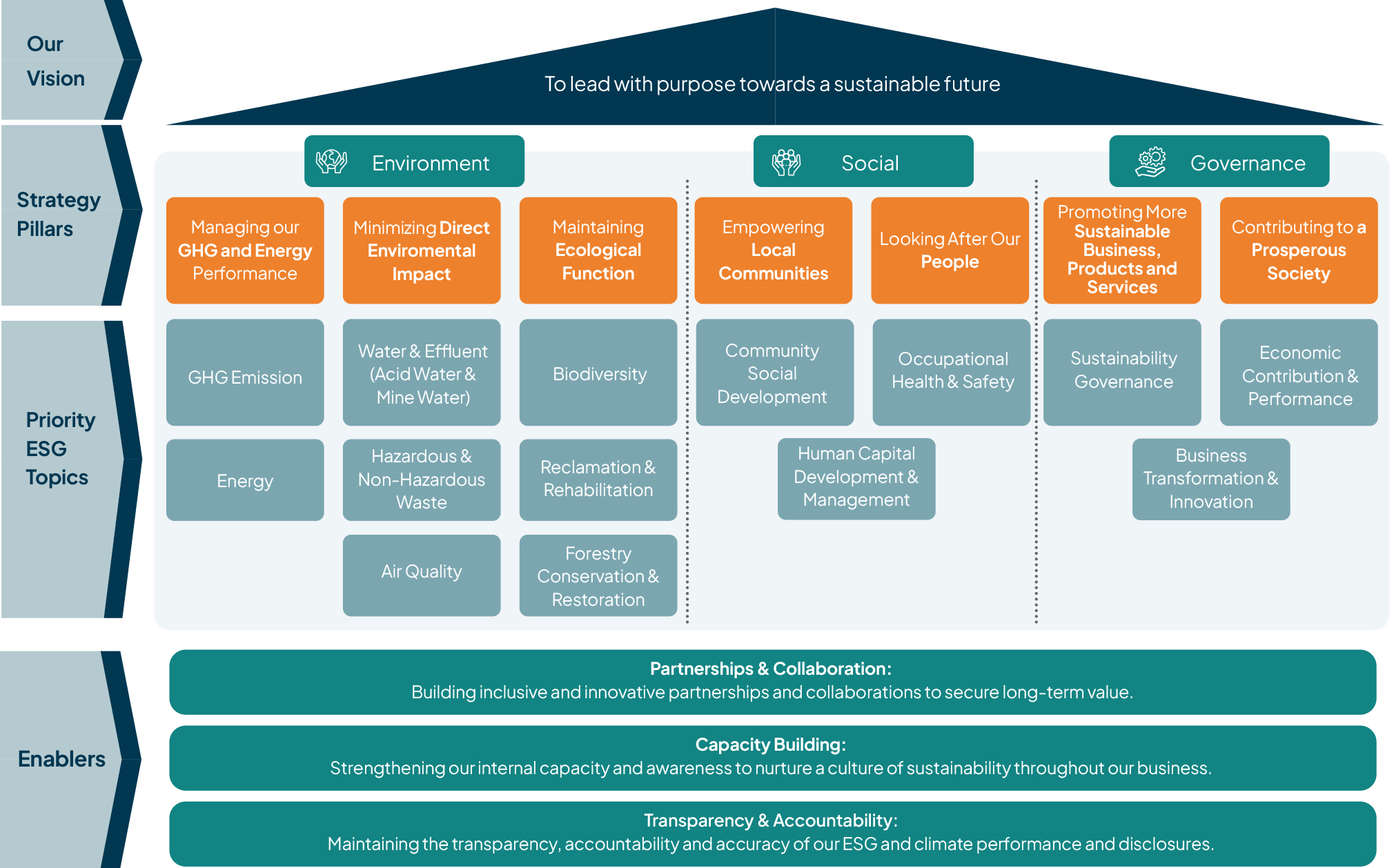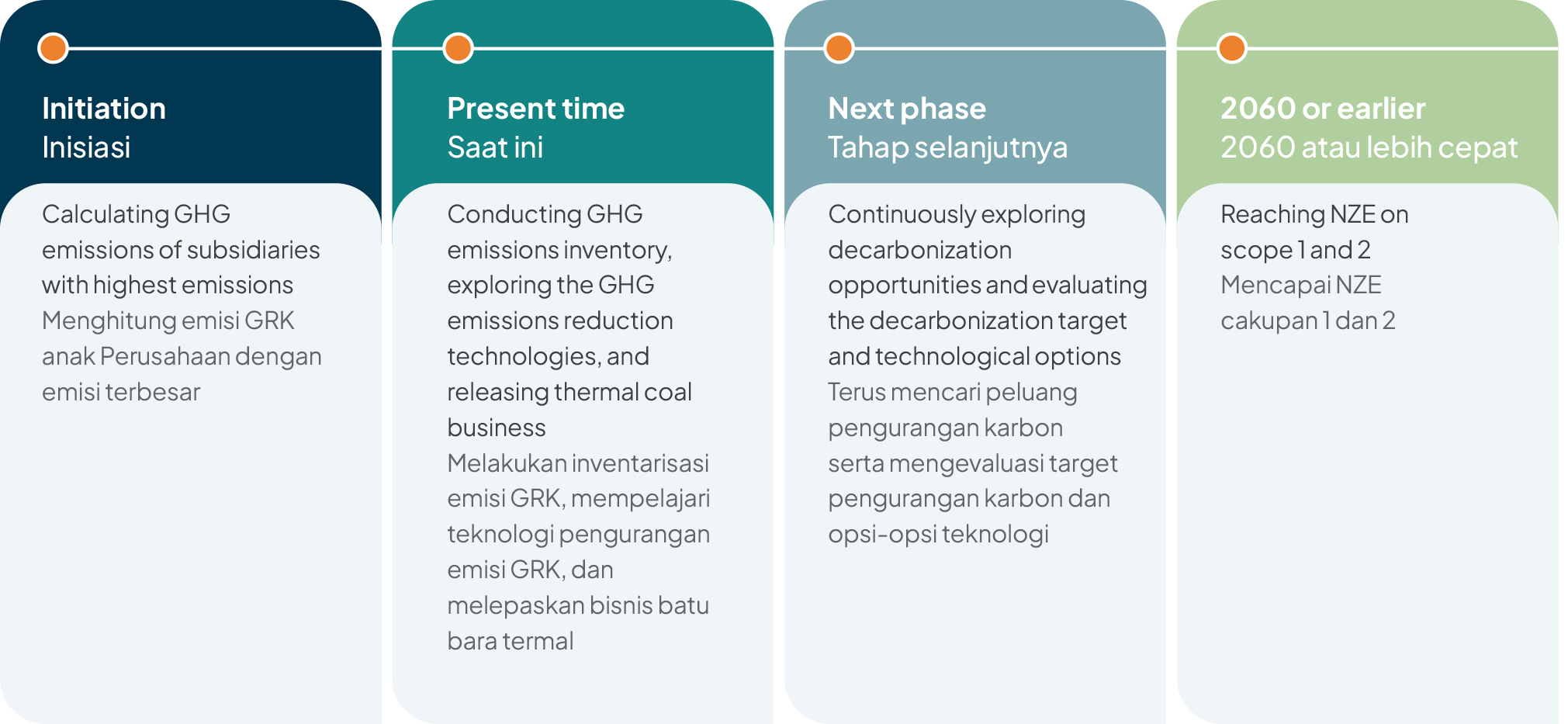ALAMTRI’S COMMITMENT
AlamTri fully supports the government’s commitment to reduce greenhouse gas (GHG) emissions, including efforts to achieve Net Zero Emissions (NZE) by 2060 or earlier through various initiatives. AlamTri has calculated the GHG emissions generated from its operational activities (Scope 1 and Scope 2) and continues to implement a range of measures for the reduction and/or sequestration of GHG emissions.
In 2023, AlamTri committed to achieving a balanced revenue composition, targeting approximately 50% of its total revenue from non-thermal coal businesses. Currently, a larger portion of the AlamTri Group’s revenue is derived from businesses unrelated to thermal coal, and this proportion will continue to grow through the development of initiatives that support Indonesia’s green ecosystem that include the development of an aluminum smelter, exploration of opportunities in various green mineral products, expansion into renewable energy businesses, and the development of markets for metallurgical coal, an essential material for steel production.
In line with AlamTri’s commitment, a series of decarbonization strategies has been prepared as follows:
- Declaring and implementing an ESG strategic framework.
- Developing a detailed calculation of GHG emissions from scope 1 and scope 2 operational activities.
- Separating from thermal coal mining business entities.
- Utilizing low-carbon fuels (biodiesel), reducing fossil fuel consumption, and generating renewable energy to support operational activities.
- Assessing the effectiveness of low-carbon fleet usage in operations.
- Preparing to participate in carbon trading and carbon offsetting initiatives.
Through PT Alamtri Renewables Indonesia, AlamTri is planning to accelerate the development of renewable energy power plants, such as solar and hydro, to support a cleaner and more competitive energy system. Meanwhile, PT Adaro Minerals Indonesia Tbk (AMI) and its subsidiaries remain focused on the mining and processing of metallurgical coal, aluminum smelters, and other minerals that play a critical role in the transition toward sustainability. With a long-term vision, AlamTri aims to generate more than 50% of its revenue from non-thermal coal businesses by 2030, reaffirming its commitment to a green economy and sustainability
Adaro’s ESG Strategy Framework

AlamTri’s ESG Strategy Framework was formulated to identify, address and manage AlamTri’s ESG risks through ESG three components: environment, social and governance. The focuses and priorities for these three components are based on the materiality and relevance to the business. The ESG Strategy Framework also includes “enablers”, or the measures set as the bases of the AlamTri’s ESG roadmap, programs, and initiatives. In line with the current global trend, among AlamTri’s priorities, the main focus is GHG emissions and energy performance management.
Sustainability Roadmap

AlamTri has demonstrated its commitment to sustainability by launching a Sustainability Roadmap aligned with the targets set by the government that outlines the strategic steps AlamTri will take to achieve its goal of creating a sustainable future for all stakeholders. AlamTri has also developed a roadmap that provides clear and measurable guidance on the steps needed to achieve its targets within a specific timeframe.
One of the key points in AlamTri’s Sustainability Roadmap is its commitment to achieving NZE by 2060 or earlier, in line with the government’s commitment outlined in the Enhanced Nationally Determined Contribution (ENDC) of 2022. Achieving this target will require extraordinary efforts from all parties within AlamTri.
The implementation of AlamTri’s NZE roadmap consists of three phases:
- Preparation Phase (2022–2030) — enhancing GHG emissions management, operational excellence, and the use of renewable energy
- Transition Phase (2030–2040) utilizing carbon reduction technologies that are both technically and commercially viable.
- Responsible Carbon Phase (2040–2060 or earlier) exploring carbon removal opportunities to address unavoidable emissions.
AlamTri’s Mitigation Efforts
- Initiated the use of biodiesel (B5) in operational activities in 2013 (currently using B35).
- Reduced fossil fuel consumption and increased the use of renewable energy through electrification, co-firing, and the development of solar PV for operational activities and infrastructure facilities.
- Implemented carbon sequestration projects, watershed rehabilitation, and revegetation to support government environmental programs, including the development of energy plantations.
- Carried out programs focused on operational excellence and energy management.
AlamTri has begun assessing the feasibility of using renewable energy to reduce biodiesel consumption, as well as exploring available technology options to ensure the effectiveness of its decarbonization efforts, such as low-carbon fuel technologies and low-emission operational fleets. Furthermore, there will be continual monitoring and adoption of advancements in decarbonization technologies as part of its commitment to achieving NZE.
